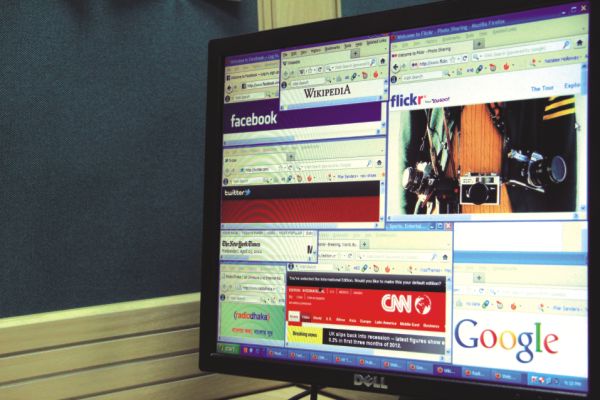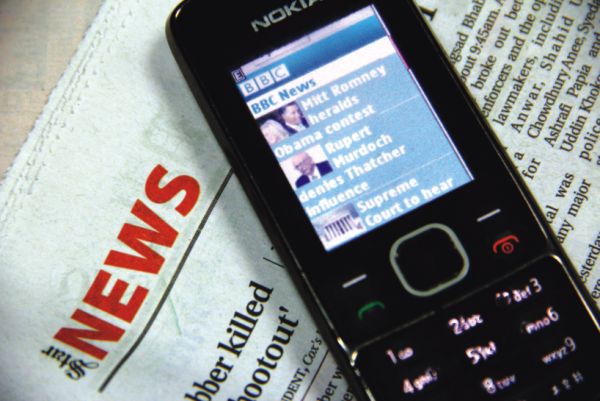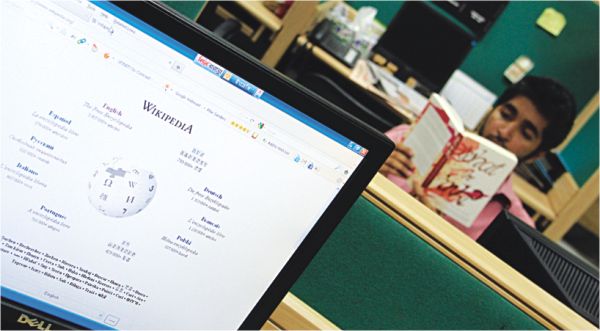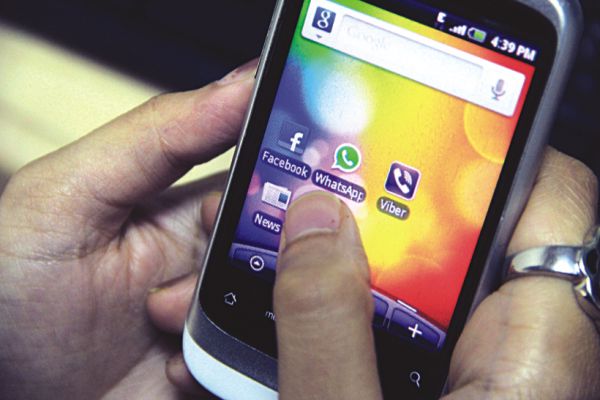| Spotlight

Easier Ways into the Cyber World
Elita Karim
Photos:Kazi Tahsin Agaz Apurbo
Almost all students, irrespective of their financial or social backgrounds, are a part of the cyber world one way or the other. While some make friends online, thanks to public and private chatrooms, keep in touch with officials via email, or surf the net to play online word games, there are others who make it a routine to browse for current affairs, politics, sports, movies, music and so much more. In short, the internet usage has increased today, as compared to the earlier years, thanks to the many kinds of devices that are available for the young people of Bangladesh today. "I am someone who is very bad with computers, devices and machines -- in a nut shell, I am technologically challenged," says Shamima Mirza, a 22-year-old student studying Economics in a private university in Dhaka. "In spite of that, I find myself using all these devices for my class work, researches or to simply browse away the time -- smart phone, my desktop, even the ipad that my friend received as a birthday gift last month! They are very user friendly and I don't find them complicated one bit!"

The internet usage has increased today, as compared to the earlier years, thanks to the many kinds of devices.
| |
 |
| |
It will not be long when student centres outside Dhaka will also have free wi-fi. |
A recent study showed that many in the global society are slightly unhappy about young people getting all immersed into the cyber world, thereby becoming oblivious and eventually invisible to the actual work around them. It's sad that the generation actually doesn't have the time to stop and smell the flowers, as they say. But in a society like Bangladesh, where life is very difficult for an average student -- lack of transport facilities, research facilities and library facilities, to name a few -- the inclination towards using different devices for net access for studying or networking is actually a good thing. "I live in Malibagh and my university is located in Bashundhara," says 21-year-old Saima Parvez, a BBA student. "In the last four of the six semesters that I spent here at the university, I had to attend a series of 8 am classes and a few 9:40 am classes as well! With waking up as early as 6 am and then coming back home at 8:30 pm -- I rarely had the energy to research as much as I wanted to. So, I bought a Symphony phone for myself, and every day, I would get on the
bus, find myself a seat and browse the net. I would answer emails, facebook, tweet, read the online news, sometimes note down points for class assignments and not to mention listen to music as well. This has helped me a lot, not only by keeping me up to date with the rest of the world, but also keeping me sane in this traffic!"

For some it is routine to browse for current affairs, politics, sports, movies, music and so much more.
With all the lounges, universities and also the famous TSC (Teacher Student Centre) at the Dhaka University being 'wi-fied,' it won't be long when most student centres in the country, outside Dhaka, will have free wi-fi not only for students, but also people of any age, who want to browse their phones, tablets or their laptops. Expecting this welcome change, many companies in Bangladesh are now creating inexpensive devices or importing them from outside, which now have become very popular amongst young students who operate on a

Information is no longer restricted to books.
| |
 |
| |
The language of new media can create waves. |
tight budget. "Some devices are very expensive and an average student studying in Bangladesh will find it difficult to purchase such devices," says Shantanu Desa, a BBA student. "For instance, an ipad would probably cost more than one lakh, and a galaxy tab would be a little less -- which would obviously be very expensive for an average student. This is where the smart phones come in. There are many smart phones available in the market now, between Tk 3,000 - Tk 12,000 which have been specially made for browsing, checking emails, tweeting or facebooking."
The internet is not only for doing your homework or creating power point presentation in class; it is also a source or resource for people who love cooking, playing the piano, making videos, watching old TV shows or just reading about famous people. Not only the students, but the parents, grandparents and other elders in the family must be exposed to this phenomenon. "There was a time when the internet was made to be 'unapproachable', 'only for the elite and the rich' and something that could be operated only 'with a high-tech understanding or education in the field of IT' and that is all a matter of the past now," says Shukti Hyder, a 25-year-old intern of a creative agency based in Dhaka. "In some families, emailing friends or chatting online was considered taboo even a decade ago. This is because of the wrong notion that had generated amongst the

Using different devices for net access for studying or networking can be a fast learning process.
elders in many families, and this was also the era when young students had begun to ask for a computer at home, so that they could do their assignments and study -- a completely foreign idea for most middle class parents. Now, of course this idea is changing and should change faster if we want a digital revolution to happen in the country!"

Students, parents, grandparents and other elders in the family must be exposed to new media.
Everyone awaits a revolution in Bangladesh, which will help students do better for themselves and also for the country, and the one revolution that can be done peacefully is definitely the digital revolution. Quite naturally, the young will be more inclined towards learning new ideas, generating and sharing more through networks that they will build online. It is now time for them to teach these techniques to their elders so that they can also enjoy this new experience and create networks of their own. Start at home with your family members, and you will see a world of changes happening right in front of your eyes for the better!
 |
Everyone can take advantage of the technology to learn and teach. |
|
